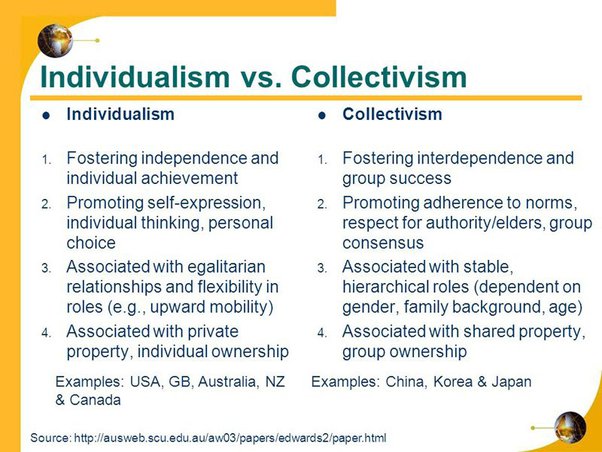In this exclusive interview, we delve into the concept of collectivist cultures, exploring how they shape individual identity and decision-making. We examine the significant role of family and community in these societies, and how collectivist values influence education and workplace dynamics. Through a comparison with individualism, we highlight the unique challenges and benefits of living in a collectivist culture. Additionally, we discuss how globalization is affecting these values and practices, and consider the future of collectivism in our increasingly interconnected world. This article provides a comprehensive overview of collectivism, offering valuable insights into its impact
Explore this topic in-depth with ritarblog.com
1. Defining Collectivism
Collectivism is a cultural value that emphasizes the importance of the group over the individual. In collectivist societies, the well-being and goals of the community, family, or group take precedence over personal ambitions and desires. This cultural orientation fosters a sense of belonging and interdependence among members, encouraging cooperation and mutual support.
In collectivist cultures, identity is closely tied to social roles and relationships. Individuals are often defined by their connections to others and their contributions to the group. Personal success is viewed through the lens of collective achievement, and actions are guided by a desire to maintain harmony and fulfill communal obligations.
The roots of collectivism can be traced to historical, social, and economic factors that have shaped societies over time. In many Asian, African, and Latin American cultures, collectivism is deeply ingrained and manifests in various aspects of daily life, from family dynamics to workplace interactions.
Understanding collectivism requires recognizing the diverse ways it influences behavior, communication, and social structures. It stands in contrast to individualism, which prioritizes personal autonomy and self-expression. By appreciating the nuances of collectivism, we gain insight into the cultural frameworks that sh
2. Collectivism’s Impact on Individual Identity and Decision-Making
In collectivist cultures, individual identity is often intertwined with the group’s identity. People see themselves primarily as members of a larger community, such as a family, clan, or social network, rather than as isolated individuals. This sense of belonging significantly influences personal identity, with individuals deriving a strong sense of self from their roles and relationships within the group.
Decision-making in collectivist societies typically prioritizes the group’s needs and goals over personal preferences. Decisions are often made collaboratively, with a focus on consensus and maintaining harmony. This collective approach ensures that actions align with the group’s values and long-term interests. Individuals may sacrifice personal desires to support the group’s welfare, demonstrating loyalty and commitment to communal objectives.
The emphasis on collective well-being shapes various aspects of life, from career choices to social behavior. For instance, career decisions may be influenced by family expectations or the potential to contribute to the community’s prosperity. Similarly, social behavior is guided by norms that promote group cohesion and mutual support.
While this collectivist orientation fosters strong, supportive networks, it can also pose challenges for personal autonomy and self-expression. Balancing individual aspirations with group expectations requires navigating complex social dynamics and understanding the cultural importance of interconnectedness. This intricate balance is a defining feature of collectivist cultures, shaping how individuals perceive themselves and their place in the world.

3. The Role of Family and Community in Collectivist Societies
:max_bytes(150000):strip_icc()/what-are-individualistic-cultures-2795273-5bcdfc01c9e77c0051d808e1.png)
In collectivist societies, family and community play pivotal roles in shaping individuals’ lives and identities. The family unit is often considered the cornerstone of social structure, providing emotional, financial, and social support. Extended families, including grandparents, aunts, uncles, and cousins, frequently live together or maintain close ties, fostering a strong sense of unity and mutual obligation.
The community extends this network of support, offering a broader sense of belonging and collective responsibility. Community members actively participate in each other’s lives, celebrating successes and providing assistance during challenging times. This interconnectedness strengthens social bonds and ensures that no individual feels isolated or unsupported.
In such societies, major life decisions—such as marriage, career choices, and even personal values—are heavily influenced by family and community expectations. The emphasis on collective well-being means that personal achievements are often viewed in the context of their contribution to the group’s prosperity and harmony.
The communal focus fosters environments where collaboration and cooperation are highly valued. Children are raised with a strong sense of duty to their family and community, learning from an early age the importance of interdependence and collective success. This nurturing environment helps to instill values of respect, loyalty, and shared responsibility, which are integral to the fabric of collectivist societies.
4. Collectivism’s Influence on Education and Workplace Dynamics

In collectivist cultures, education and workplace dynamics are profoundly shaped by the values of community and cooperation. From an early age, educational systems emphasize the importance of group harmony and collaborative learning. Students are encouraged to work together, share knowledge, and support their peers, fostering a sense of collective responsibility and mutual achievement. Success is often measured by the group’s overall performance rather than individual accomplishments, reinforcing the idea that everyone’s efforts contribute to the common good.
Teachers and educational institutions play a significant role in instilling these values, often acting as authority figures who guide students not just academically but also morally and socially. Respect for teachers and adherence to their guidance are paramount, reflecting the broader societal emphasis on respecting elders and those in positions of authority.
In the workplace, collectivist values translate into a preference for teamwork and consensus-building. Decision-making processes are typically inclusive, seeking input from all team members to ensure that outcomes benefit the entire group. Hierarchical structures are respected, but leaders are expected to act in the best interests of their team, emphasizing collective success over individual gain.
Work relationships are often viewed as extensions of family ties, with a strong focus on loyalty, trust, and long-term commitment. This approach can lead to a highly supportive work environment where collaboration and mutual aid are prioritized. However, it can also mean that personal ambitions are sometimes secondary to group goals, requiring individuals to balance their aspirations with the needs of their colleagues and organization.
5. Comparing and Contrasting Collectivism with Individualism
Collectivism and individualism represent two contrasting cultural paradigms. Collectivism prioritizes the group over the individual, emphasizing interdependence, mutual support, and communal success. In collectivist societies, personal identity and decisions are deeply influenced by family, community, and social roles. Cooperation and harmony are valued, with individuals often sacrificing personal desires for the group’s welfare.
In contrast, individualism emphasizes personal autonomy, self-expression, and individual rights. Individualist cultures celebrate personal achievements and encourage self-reliance. Decision-making is typically centered on personal preferences and goals, with less emphasis on group consensus or communal obligations.
While collectivism fosters strong social bonds and a sense of belonging, it can sometimes limit personal freedom and self-expression. Conversely, individualism promotes independence and personal growth but can lead to social fragmentation and a lack of communal support. Understanding these differences helps to appreciate the diverse ways cultures balance personal and collective needs, shaping societal norms and behaviors.

6. The Challenges and Benefits of Living in a Collectivist Culture
Living in a collectivist culture offers both challenges and benefits that significantly shape individuals’ experiences and societal dynamics. One of the primary benefits is the strong sense of community and belonging. Individuals feel supported by their family and community, which provides a reliable network for emotional, financial, and social support. This interconnectedness fosters resilience and mutual aid, especially during times of crisis or hardship.
However, the emphasis on group harmony and collective well-being can sometimes limit personal freedom and self-expression. Individuals may feel pressured to conform to societal norms and expectations, sacrificing their personal desires and ambitions for the sake of the group’s harmony. This can lead to internal conflicts and a sense of stifled individuality.
Another benefit is the collaborative approach to problem-solving and decision-making, which can lead to well-rounded and inclusive outcomes. The focus on consensus and mutual support in educational and workplace settings enhances teamwork and reduces interpersonal conflicts.
On the downside, this collective approach can slow down decision-making processes and stifle innovation, as maintaining harmony often takes precedence over challenging the status quo or introducing disruptive ideas. Balancing personal aspirations with communal expectations remains a constant challenge, requiring individuals to navigate the complexities of living in a closely-knit society.

7. How Globalization is Shaping Collectivist Values and Practices
Globalization is significantly influencing collectivist values and practices, creating both opportunities and challenges for these cultures. As global connectivity increases, collectivist societies are exposed to diverse ideas, values, and lifestyles, leading to a blending of cultural norms. This exposure encourages greater openness and adaptability, allowing collectivist cultures to integrate beneficial aspects of individualism, such as personal autonomy and innovation.
However, globalization also poses challenges to traditional collectivist values. The emphasis on individual success and self-reliance, prevalent in many global narratives, can create tension within communities that prioritize group harmony and collective well-being. Younger generations, in particular, may feel torn between adhering to traditional values and embracing global individualistic trends.
Despite these challenges, globalization can also strengthen collectivist practices by providing platforms for cross-cultural collaboration and mutual support. Technology enables collectivist communities to maintain close ties despite geographical distances, reinforcing the importance of family and community connections.
Ultimately, globalization is reshaping collectivist values and practices, prompting a dynamic interplay between preserving cultural heritage and adapting to a rapidly changing world. This evolution highlights the resilience and adaptability of collectivist societies in the face of global influences.
8. The Future of Collectivism in an Increasingly Interconnected World
As the world becomes increasingly interconnected, the future of collectivism is likely to be marked by both continuity and transformation. Collectivist cultures, rooted in values of community and interdependence, will continue to provide strong social support systems and foster close-knit relationships. These cultures are likely to maintain their emphasis on collective well-being, particularly in areas where traditional values are deeply ingrained and cherished.
However, the pressures of globalization and the influence of individualistic cultures are expected to lead to significant changes. The influx of global ideas and practices may introduce new perspectives on personal autonomy and self-expression, challenging traditional collectivist norms. Younger generations may increasingly integrate aspects of individualism, such as personal ambition and innovation, while still valuing the communal support and harmony intrinsic to their cultural heritage.
Technological advancements will play a crucial role in this evolution. Digital connectivity will enable collectivist communities to interact with and learn from diverse cultures, facilitating a more nuanced and adaptable approach to collectivist values. This interconnectedness can enhance collaborative efforts and support systems, bridging cultural divides and fostering cross-cultural understanding.
In summary, while collectivism will continue to be a cornerstone of many societies, its expression and practice will evolve in response to the dynamic global landscape, balancing traditional values with the
In conclusion, collectivism profoundly shapes individual identity, decision-making, and societal dynamics. While it offers strong communal support and collaborative benefits, it also faces challenges from globalization and the push towards individualism. As cultures navigate this evolving landscape, they will likely blend traditional values with new perspectives, creating a dynamic interplay that reflects both the enduring strength and adaptability of collectivist principles in a connected world
ritarblog.com
ritarblog.com

